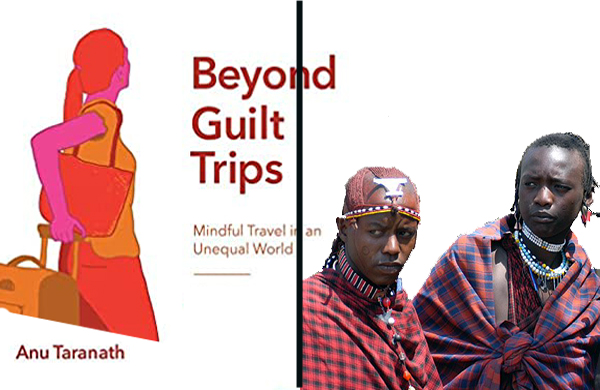 To everyone planning travel : Listen to NPR’s latest podcast of “To The Best of our Knowledge” after, of course, first reading this blog. And then, buy and read “Beyond Guilt Travel,” remembering, of course, this blog.
To everyone planning travel : Listen to NPR’s latest podcast of “To The Best of our Knowledge” after, of course, first reading this blog. And then, buy and read “Beyond Guilt Travel,” remembering, of course, this blog.
“To The Best of Our Knowledge” is an often dead-pan basement interviewing machine adroitly edited to keep you awake. When successful you actually learn quite a lot. Ditto for this week’s podcast about travel.
Several root cautions to achieving that enjoyment from this particular podcast: First, the perspective is annoyingly youthful. So plug in those earbuds and pre-bite those lips, because there’s not a whole lot of wisdom here. The protagonists instructing us on correct travel haven’t traveled very much compared to most of my readers. A huge mistake they make is to generalize across time and space.
I was really struck, for example, by one of the best guests who casually remarked how inappropriately-prepared travelers always pine for “clean bathrooms.” Her obvious implication was that insensitive travelers expect dirty bathrooms. Clearly she conveniently forgot her time in American airports, bus and train stations, Wall-Marts, subways or most school bathrooms.
Second, the really bad parts of today’s (I concede) woke culture is the presumption that outsiders’ perspectives aren’t worth much and are often destructive.
This strikes me as more envy than analysis.
But this guest brought up a deeply important topic when she (an Asian-American) experienced racism when traveling, and not just against herself. She remarked how so many travelers remark that they felt “entirely safe” among black Africans, in contrast to living among black people at home.
This realization is often an epiphany for many travelers, and creates individual paths away from racism through introspection that would not otherwise exist. When the realization is not an epiphany and doesn’t lead to any introspection it simply enforces one’s racism, which provides the rest of us with clearer examples.
So while this is certainly a negative phenomenon at its onset, over the years I’ve seen it bloom into very worthwhile outcomes.
I gave special attention to the guest who had traveled to Tanzania and was critical of the “customary” wish of foreigners to visit a Maasai village. Readers of this blog know how critical I am of village scams. But her fear was that it seemed patronizing, and then as expected, she qualified her criticism with the understanding that tourism is so important to the economy that maybe one should overlook this little problem. She applied this in particular to her belief that all village visits come with an invitation to bring pencils and crayons as gifts.
Please read my hundred or so blogs on this, but suffice it to say that her inclinations are correct: don’t worry about not visiting a village and don’t bring crayons if you do.
And finally the most hilarious – then on reflection somewhat valuable section was how to travel non-zero. This is jargon for keeping your carbon footprint low when you travel, and I immediately thought of Richard Branson’s major announcement when he began Virgin Airways: that it was going to create an airline with a near zero carbon footprint.
Well, like all such claims, the realization comes in the zero-carbon marketplace, where the steel mill buys credits from the vegan tree farmer. In reality there’s not an airplane flying that doesn’t hugely contribute to global warming. Seriously, the guest recommended that travelers tally up their carbon destruction and at the end of the year plant a sufficient number of trees to offset it.
These kinds of solutions are totally impractical for most travelers, since most travelers come from densely urban areas where their only real option is to buy into a not-for-profit organization offering to represent them. And that often comes with even worse pitfalls.
This guest has also calculated that the least carbon damage is done on 4-hour flights. So, for example, she recommends against flying nonstop from the west coast to London, but rather connect west coast to east coast to London. Of course nonsense like this fails to compare fuel efficient planes with jet fuel guzzlers, the cost of docking and undocking a giant airplane machine, the carbon damage of walking around a secure airport and having a Starbucks, much less contributing to that dirty bathroom.
And that about sums up the whole podcast. A lot of good intentions begging much better justification than when given with such casual analysis.
So don’t unpack those bags! Don’t worry if your trip to a new place is brief: every moment of something different and new will help you help the whole world. Be skeptical about “traditional sightseeing” but figure out a way to replace the scam village with a real town. Recognize that instead of buying a coloring set (or computer) at Target that giving the recipient the cash will save resources and be infinitely more productive. Don’t believe for an instant that making a connection to Narita through Anchorage will save the Amazon. Reflect on yourself as a traveler as much as other travelers. Listen to this podcast.
And most of all, travel humbly. Don’t presume you know too much.
And the world will be a better place.